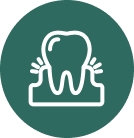Examination and Consultation
Thorough oral exam and treatment plan focusing on teeth, gums, bone and tissue.

What to expect
All new patients receive a thorough oral examination that focuses on both soft (gums, tongue, etc.) and hard tissues (teeth, supporting bone, etc.). The check-up and treatment plan are tailored to the patient's unique needs.
Actions taken:
- Investigation of concerns: Patients are encouraged to share any aches or concerns before the examination starts, as this often takes priority.
- Baseline charting: The dentist takes note of the patient's existing teeth and fillings, which is important for treatment planning and monitoring progress.
- Assessment of periodontal health and decay: The dentist assesses the patient's gum health and any existing decay, as the health of the teeth and gums are interdependent.
- X-rays: X-rays are taken once a year or every two years, depending on the patient's risk level for dental decay. The radiographs aid in detecting decay between teeth.
- Radiographs and special tests: Radiographs and special tests are taken on a yearly basis or every two years, depending on the patient's oral health status. The dentist will discuss what is most appropriate for the patient.
- Written treatment plan: The dentist provides a written plan outlining various treatment options, estimated costs, and time frames. For complex cases, the written plan may not be presented at the initial consultation.
- Regular recalls: Patients are encouraged to have regular dental check-ups to detect and resolve any issues that may threaten their oral health. Recalls are either 6- or 12-monthly, and reminders are sent a few weeks before the recall is due.





